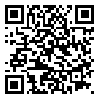Volume 19, Issue 4 (3-2022)
sjsph 2022, 19(4): 451-468 |
Back to browse issues page
Download citation:
BibTeX | RIS | EndNote | Medlars | ProCite | Reference Manager | RefWorks
Send citation to:



BibTeX | RIS | EndNote | Medlars | ProCite | Reference Manager | RefWorks
Send citation to:
Mohammadi-Shahboulaghi F, Ramezani T, Panahizadeh D, Hazarian S, Fadayevatan R. Designing, Implementing and Evaluating a Model for Delivering Outpatient Health Care Services to the Elderly Population of the Social Security Organization of Tehran Province. sjsph 2022; 19 (4) :451-468
URL: http://sjsph.tums.ac.ir/article-1-6092-en.html
URL: http://sjsph.tums.ac.ir/article-1-6092-en.html
Farahnaz Mohammadi-Shahboulaghi1 
 , Tahereh Ramezani2
, Tahereh Ramezani2 
 , Dariush Panahizadeh3
, Dariush Panahizadeh3 
 , Sholeh Hazarian4
, Sholeh Hazarian4 
 , Reza Fadayevatan *
, Reza Fadayevatan * 
 5
5

 , Tahereh Ramezani2
, Tahereh Ramezani2 
 , Dariush Panahizadeh3
, Dariush Panahizadeh3 
 , Sholeh Hazarian4
, Sholeh Hazarian4 
 , Reza Fadayevatan *
, Reza Fadayevatan * 
 5
5
1- Ph.D. Professor, Iranian Research Center on Aging, Nursing Department, University of Social Welfare and Rehabilitation Sciences, Tehran, Iran
2- Ph.D. Student, Iranian Research Center on Aging, University of Social Welfare and Rehabilitation Sciences, Tehran, Iran
3- MD. MPH. Director at Deputy of Treatment, Social Security Organization, Tehran, Iran
4- MD. MPH. Head of the Department of Chronic Diseases and Aging, Social Security organization, Tehran, Iran
5- Ph.D. Associate Professor, Department of Aging, Iranian Research Center on Aging, University of Social Welfare and Rehabilitation Sciences, Tehran, Iran ,reza1092@yahoo.com
2- Ph.D. Student, Iranian Research Center on Aging, University of Social Welfare and Rehabilitation Sciences, Tehran, Iran
3- MD. MPH. Director at Deputy of Treatment, Social Security Organization, Tehran, Iran
4- MD. MPH. Head of the Department of Chronic Diseases and Aging, Social Security organization, Tehran, Iran
5- Ph.D. Associate Professor, Department of Aging, Iranian Research Center on Aging, University of Social Welfare and Rehabilitation Sciences, Tehran, Iran ,
Abstract: (1992 Views)
Background and Aim: Delivering health services to the elderly is one of the most important responsibilities of the health care system of any country. In order to improve the provision of health services to the elderly population under its coverage, the National Social Security Organization conducted this study with the aim of designing, implementing and evaluating a model for providing outpatient health care services to the elderly population under the coverage of its Tehran Province Office.
Materials and Methods: This was a sequential-exploratory mixed-method study. The initial model was developed and validated using the integrated review method and the final model using the Delphi technique and group discussions with experts. Then the educational program was developed and implemented for the health team. Assessment of the effectiveness of the program was done using a researcher-made knowledge and attitude questionnaire (pre- and post-test). The model was then implemented in the Khandan-e-Hakim Clinic. The effectiveness of the model implementation was determined based on the qualitative content analysis of the interviews with the elderly and qualitative content analysis of the health team comments.
Results: The outpatient care model of the elderly included an organized clinical process consisting of 6 phases. The mean age of the health team members was 45.7±15.11 years. The difference between the health team satisfaction total scores before and after participating in the educational program was statistically significant (P≤0.05). Further analysis of the data showed, based on the interviews with the elderly, the main categories to be "assessment of cognitive function, mood and behavior", "physical assessment", "appreciation of the health and dignity of the elderly" and "satisfaction of the elderly and their companions". Analysis of the comments of the health team revealed their satisfaction with the implementation of the model.
Conclusion: The introduced model can make possible rapid identification of health problems and timely intervention in the elderly population. This implementation model will help disease prevention and complications at different levels. The findings of this study can help service providers to provide better care and health services for the elderly.
Materials and Methods: This was a sequential-exploratory mixed-method study. The initial model was developed and validated using the integrated review method and the final model using the Delphi technique and group discussions with experts. Then the educational program was developed and implemented for the health team. Assessment of the effectiveness of the program was done using a researcher-made knowledge and attitude questionnaire (pre- and post-test). The model was then implemented in the Khandan-e-Hakim Clinic. The effectiveness of the model implementation was determined based on the qualitative content analysis of the interviews with the elderly and qualitative content analysis of the health team comments.
Results: The outpatient care model of the elderly included an organized clinical process consisting of 6 phases. The mean age of the health team members was 45.7±15.11 years. The difference between the health team satisfaction total scores before and after participating in the educational program was statistically significant (P≤0.05). Further analysis of the data showed, based on the interviews with the elderly, the main categories to be "assessment of cognitive function, mood and behavior", "physical assessment", "appreciation of the health and dignity of the elderly" and "satisfaction of the elderly and their companions". Analysis of the comments of the health team revealed their satisfaction with the implementation of the model.
Conclusion: The introduced model can make possible rapid identification of health problems and timely intervention in the elderly population. This implementation model will help disease prevention and complications at different levels. The findings of this study can help service providers to provide better care and health services for the elderly.
Keywords: Model, Outpatient Health Care Services, Elderly, Social Security Organization, Tehran Province
Type of Study: Research |
Subject:
Public Health
Received: 2022/07/5 | Accepted: 2022/03/19 | Published: 2022/07/6
Received: 2022/07/5 | Accepted: 2022/03/19 | Published: 2022/07/6
Send email to the article author
| Rights and permissions | |
 |
This work is licensed under a Creative Commons Attribution-NonCommercial 4.0 International License. |



